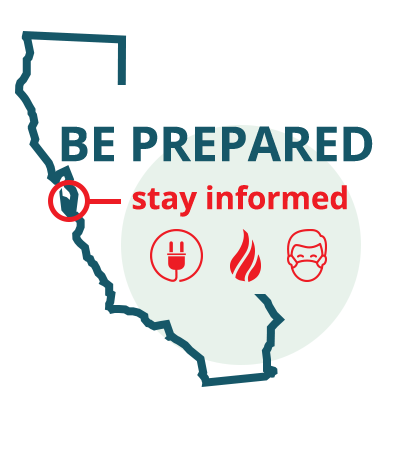Protect Yourself from Wildfire Smoke
Wildfire smoke is unhealthy for anyone to breathe. It can cause breathing problems, coughing, sore throat, sinus issues, eye irritation and other symptoms. When smoke is in the air, you should do what you can to protect your health. Smoke can be especially dangerous to seniors, pregnant women, children and people with respiratory conditions (such as asthma, emphysema or lung disease). If you have a respiratory condition, be sure to follow your care plan. Contact your PCP if you have questions or concerns.
Important information for people who use electricity to refrigerate medications or run medical equipment.
Protect yourself and your family from wildfire smoke
Know when smoke is affecting your area's air
- Sign up to get air quality alerts for your area (by text or email)
The best way to protect your health is to avoid or limit exposure to smoky air
- Go indoors and close all the windows and doors
- If you cannot go home, find someplace else where you can be indoors
- If you must be outdoors, try not to engage in strenuous activity
- Seal up cracks around doors and windows
- For now, you can use household items like towels or duct tape
- You can also weatherize your home as a more permanent fix
- If you can get an air filter (either stand-alone HEPA or as part of your heating/cooling system), that will help keep your indoor air clean
- If you have a heating/cooling system, set it to “recirculate” to keep outside air from coming in
Protect your body
- Drink lots of water to stay hydrated
- Wear a mask: but know that only two types of masks (N95 and P100) offer any protection against wildfire smoke
- These masks are also called respirators
- For information about when a mask/respirator may help you and how to choose which one to use, read AirNow's fact sheet
- Be aware that these masks/respirators are not made to fit children.
Precautions for vulnerable people and pets
- Smoke can be more of a danger to some people, such as pregnant women and people with chronic lung conditions
- If you or someone in your house is pregnant or has a chronic condition, make the special preparations advised by the CDC
- Pets can get sick from wildfire smoke just like people
- To keep your pets safe when air is smoky, keep them indoors
- Also make sure they always have clean water to drink
If you have questions about your health
First, call your primary care provider (PCP). If you have a question about how smoke may affect a specific condition that you see a specialist about, you can call your specialist. HPSM covers telemedicine,
which is talking to your doctor by phone or video. Ask your PCP if they offer telemedicine.
If you can’t reach your doctor, call HPSM’s Nurse Advice Line at 1-833-846-8773. Licensed
Registered Nurses (RNs) can give you medical advice 24 hours a day, 7 days a week.
